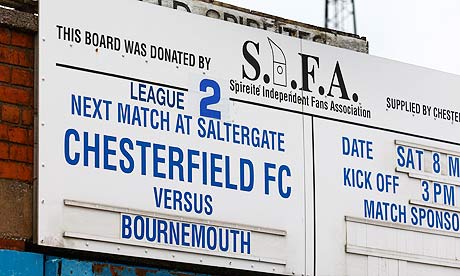Post by QPR Report on May 9, 2010 8:42:40 GMT
David Conn/The Observer
After 139 years, Saltergate gives way to housing and hospitalityCorporate concerns override nostalgia and history as Chesterfield's venerable stadium sees its final game
(1)Tweet this (8)
David Conn The Observer, Sunday 9 May 2010 Article history
Chesterfield v Bournemouth, the last game at Saltergate. Photograph: Fabio De Paola for the Guardian
Chesterfield fans could not hold their emotions back in the closing seconds of the home game against Bournemouth, swarming on to the pitch from the Kop end after a low strike from the midfielder Derek Niven, five minutes into injury time, ensured that the club's 139-year tenure of its Saltergate ground would finish with a 2-1 victory.
Rusty, rickety Saltergate, one of the oldest football grounds in England and therefore the world, played on by Chesterfield since 1871, will now be demolished and houses built on the site. The club, formed in 1866, the Football League's fourth oldest, will forge its modern future in a £13m, 10,500 all-seater stadium, its name already sold for sponsorship to b2net, a data company.
Morecambe are also leaving their old Christie Ground for a new £12m stadium, so two more long-established clubs are departing the old football homes, crammed between terraced streets. Chesterfield's farewell began with a nostalgia-fest at the town's Pomegranate Theatre, a celebration of some highlights: Football League status achieved in 1899; stints in the old Second Division which ended in relegation in 1951, periodic promotions and, shining out, the FA Cup run of 1996-1997, when John Duncan's side reached the semi-final at Old Trafford. There they drew 3-3 with a Middlesbrough side which included Juninho and Fabrizio Ravanelli, before losing the replay 3-0.
Duncan recalled Nottingham Forest's players, beaten in the fifth round then, being "not too enamoured" with the cramped, ragged basics of Saltergate: "But we never thought Saltergate was anything other than a good place to be," he said. "It is a very atmospheric home for football." At the ground, the club chairman, Barrie Hubbard, 72, who first wandered down to Saltergate to watch Chesterfield when he was eight, gazed out from the directors' box.
"This is a lovely football ground, yes," he mused, sitting in the wood and steel main stand built by the football ground architect Archibald Leitch in 1936 and barely spruced up since. "But we've got nothing here. If you wanted a sandwich now I wouldn't know where to find you one. The new place will have everything.
"There will be some tears today, but we have to do it, for progress."
For progress, and money – or "revenue opportunities," as the club's chief executive, Carol Wilby, articulated it. At the b2net, Chesterfield will have conferencing and banqueting, and all the other earning necessities for the modern football club of which the original founders, meeting in Victorian pubs, would never have dreamed.
All this history almost ended nine years ago, when Chesterfield were taken over by Darren Brown, then 29, who purported to have cash to invest but in fact took £800,000 out, spending portions of it on smart cars and a deposit for a house, while hocking Saltergate to moneylenders. Chesterfield were saved by the fans, who rallied round to expose Brown, formed a trust which took over the club, then put it into administration to begin to piece it back together. Brown later received a four year prison sentence after pleading guilty to fraudulent trading, a brutal lesson for the Football League, which led to the introduction of the "fit and proper person test" for club owners and directors.
John Croot, a trust founder member, now community director at the club itself, said yesterday of that episode: "It was horrendous, but it also brought supporters together. People realised how much the club, the ground, and all the history, meant to them, and made a huge collective effort. The club was nearly driven out of business, but the campaign led to the platform being created for the club to rebuilt."
The supporters' trust was pragmatic, recognising early that fundraising from fans could not raise the steepling sums required to fill the holes Brown left, and they asked Hubbard, and other local businessmen Mike Warner and Alan Walters, to help finance the recovery. The trust then agreed to cede its cherished ownership of the club, to allow investment on a scale which could see a new stadium built.
Last year Dave Allen, the casino owner who had been the chairman for an unhappy tenure at Sheffield Wednesday, left Hillsborough and invested £4m to become the 80% owner of Chesterfield. He has loaned a further £2m towards the building of the b2net stadium, £1.6m has come in grants from the Football Foundation, and around £2.2m is being made from the sale of Saltergate for housing.
In the tributes paid to the old place yesterday, some select great players – including Gordon Banks, whose career began at Chesterfield in November 1958 – and Chesterfield's occasional successes were given due prominence. But in truth it was appropriate that despite victory over promoted Bournemouth, in the very last Football League match to end 139 years of history, results elsewhere meant Chesterfield did not make the League Two play-offs this season. The central themes of this sporting story are not triumph and glory, but longevity, loyalty, commitment.
After the final whistle, the fans poured back on to the pitch again, this time milling around, taking in the last moments of Saltergate, with the club song from the 1996-97 cup run playing on the PA: " We can build our dreams".
The Spireites will hope that in the brave new world of obstruction-free seating and naming rights at the b2net Stadium, there will still be space for dreams.
www.guardian.co.uk/football/2010/may/09/saltergate-chesterfield

